Year In Review: Luxury Makes Material Moves
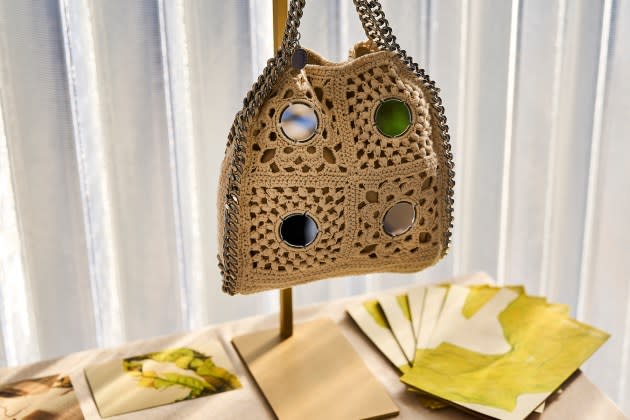
While previous years saw fast-fashion giants like H&M and Bestseller help emerging technologies scale and hit the market, the luxury industry stepped up to the plate this year, shedding its animal skin-ridden past in favor of more sustainable materials.
Here are some of the biggest collaborations in material innovation from 2023.
More from Sourcing Journal
Stella McCartney x Keel Labs
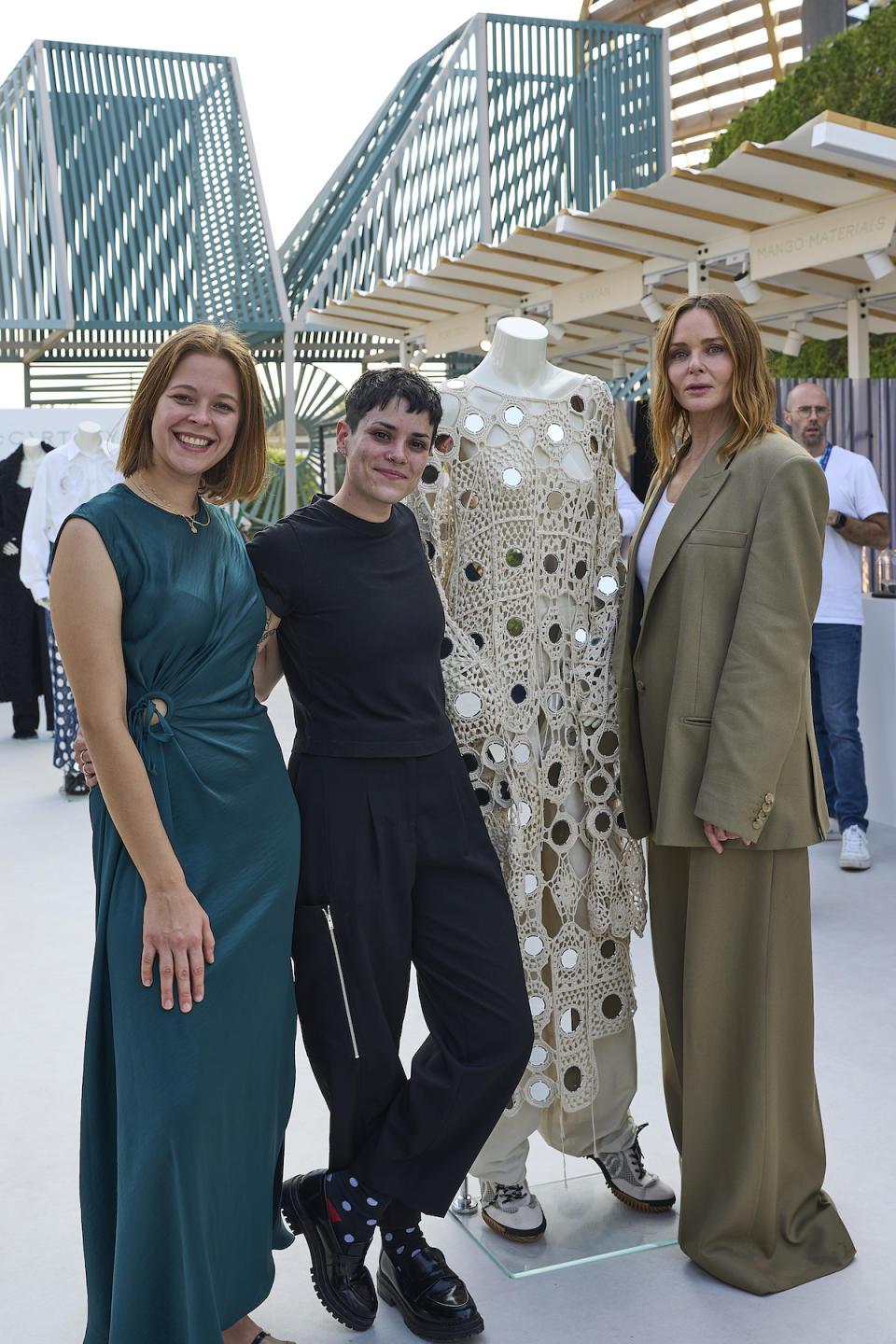
Stella McCartney trail-blazed the path toward next-generation materials in myriad ways. To showcase current cutting-edge or soon-to-be-available technologies, the eco-conscious British luxury house hosted an exhibition at COP28 in November, platforming the future of material innovation by highlighting 15 next-gen innovators, offering a glimpse at the sustainable materials poised to reshape and redefine the industry.
And one of those featured forerunners was the startup Keel Labs, a sustainable materials company addressing the highly polluting systems of textile production with aquaculture-based technologies.
“It’s our mission to transform the textile industry and the world by harnessing the radical potential of our oceans, and we can’t do it alone,” said Tessa Callaghan, co-founder and CEO of Keel Labs. “Bringing about change requires not only the development of biomaterials, but also policy, government support and direct action from global brands to bring them to scale.”
The Sustainable Market exhibit featured Keel Labs’ flagship product, Kelsun fiber—a seaweed-based material made from more than 75 percent seaweed with a significantly lower footprint than legacy fibers. As a drop-in solution for existing yarn and textile production infrastructure, Kelsun is designed for scale. Kelsun uses an abundant biopolymer found in seaweed—one of the world’s most regenerative and carbon-sequestering organisms—to create an alternative to traditional fibers such as cotton.
A dress and jumper from Stella McCartney’s Summer 2024 catwalk collection utilizing the biomaterial was on display.
“In my recent Summer 2024 runway show, we worked with the visionaries at Keel Labs on a seaweed-based yarn, Kelsun, grown from renewable and regenerative kelp that uses the ocean’s resources to protect it,” Stella McCartney said. “This could also offer a planet-friendly alternative to cotton, which accounts for 2.5 percent of the world’s arable land and 16 percent of all pesticide use. Kelsun uses 70 times less water than conventional water and 100 percent less land and pesticide use. This is the future of fashion.”
Ganni x Modern Synthesis
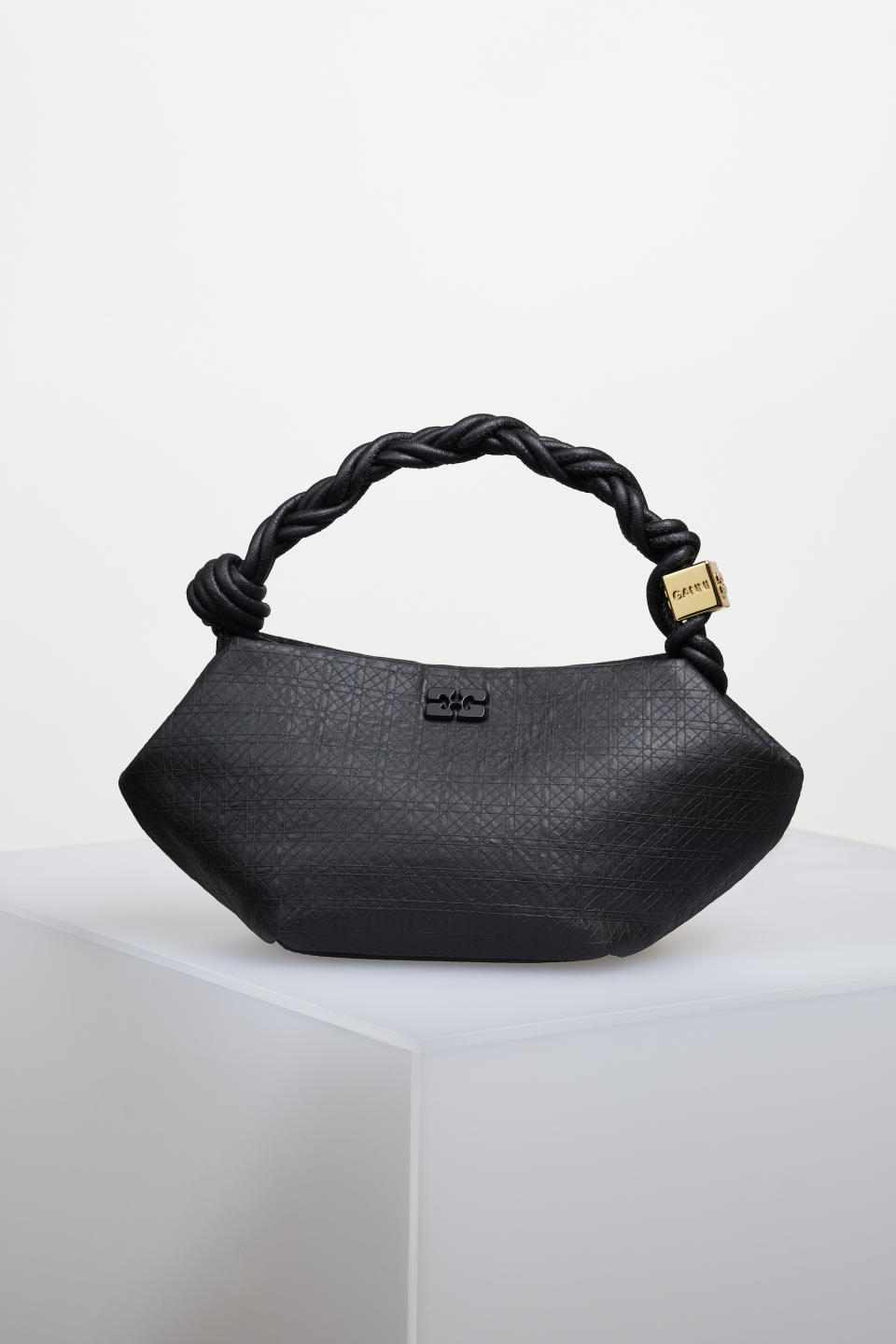
Ganni’s iconic “Bou” bag was baptized in the bacterial nanocellulose materials produced by Modern Synthesis.
Aligning with Modern Synthesis advances the Danish fashion imprint’s goal to “phase out all virgin leather by the end of this year,” said Lauren Bartley, sustainability and CSR director for Ganni.
The animal-free Bou bag debuted at the London Design Festival’s Material Matter fair in September, furthering Ganni’s goal of having 10 percent of its materials come from its Fabrics of the Future program, which is focused on “responsible alternatives” to conventional fashion inputs, by 2025.
Modern Synthesis harnesses the power of bacterial fermentation to produce a plastic-, petrochemical- and animal-free biotextile. Bacteria commonly found in kombucha—K. rhaeticus—digests sugars sourced from agricultural waste into nanocellulose fibers, creating a biofilm that the Fashion for Good innovator then manipulates into a fashion-ready material, according to Jean Keane, Modern Synthesis co-founder and CEO.
“By observing how microbes produce nanocellulose in the wild, Modern Synthesis has developed the ability to alter specific material properties, like thickness or pliability,” Keane continued. “This enables [us] to produce materials which are tailor-made for specific product applications, like handbags or shoe uppers. For the Ganni Bou Bag, [we] created a unique natural textile using [our] in-house robotic weaving system to give the material its distinct aesthetic—in this case, cotton yarn was used to create a pattern which is not currently offered through conventional textile production.”
Modern Synthesis’ material process is designed to fit into existing textile infrastructure to scale production rapidly. And the London-based biotech company is currently working on scaling its own material production “so that our lower-impact biotextiles are more accessible to all,” Keane said.
Balenciaga x Gozen
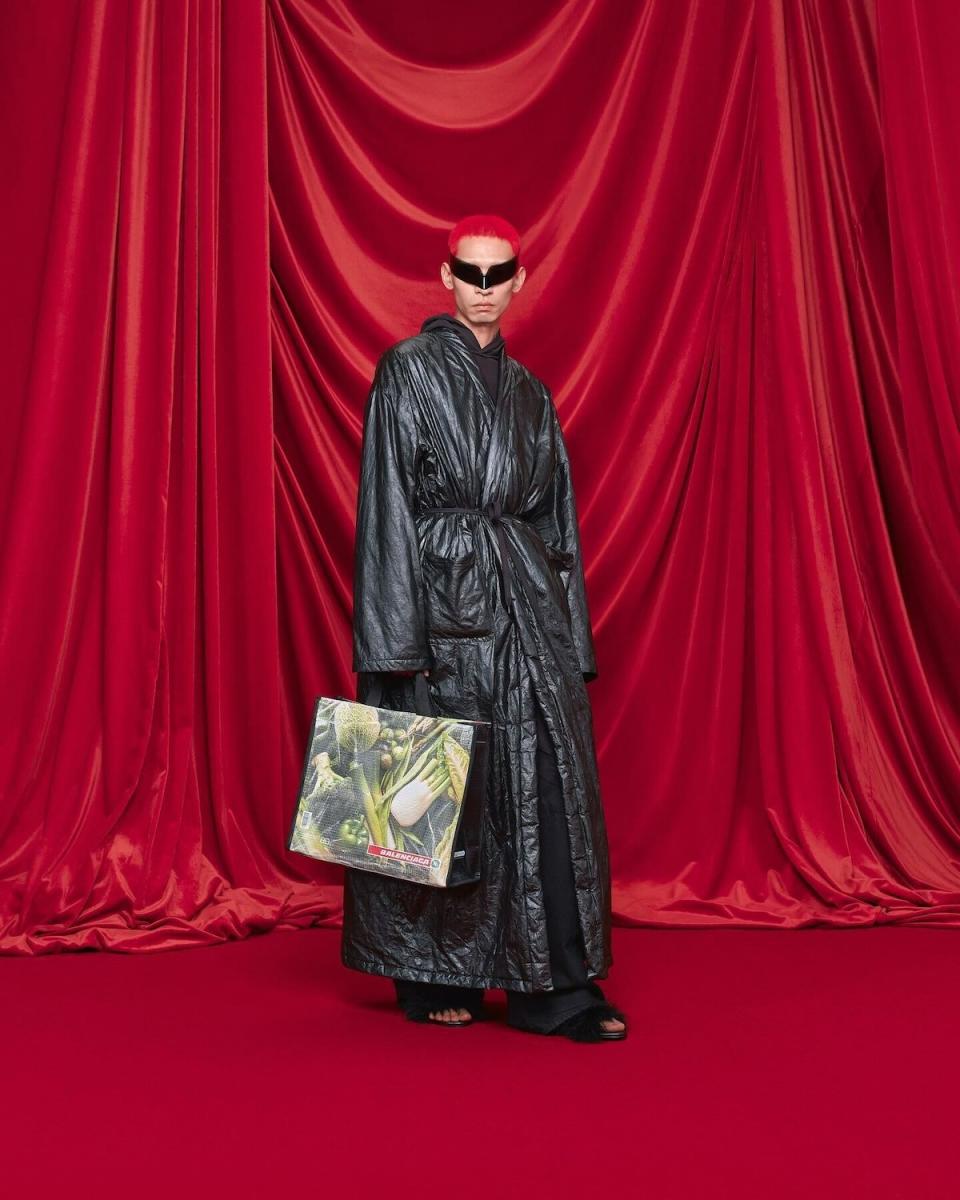
Biomaterials startup Gozen launched Lunaform, a first-of-its-kind sustainable material that’s plastic and animal-free, on the Balenciaga runway at Paris Fashion Week.
The process of making Lunaform combines “nature’s ingenuity” with science, the company said, as it’s an entirely bio-based foundation. In a nutrient-rich environment, microorganisms make ultra-crystalline patterns. Natural agents are then introduced, which leads to the formation of a 3D super-material. And that material is not composed of those microorganisms, but rather, the byproduct of their innate activity. The entire process is vegan and non-GMO, the company said.
The partnership between Gozen and Balenciaga has been in the works for two years, as the biomaterial company “worked tirelessly” to meet the luxury brand’s requirements. The resulting garment is the Balenciaga Lunaform Maxi Bathrobe Coat as part of the brand’s Summer 2024 collection.
“Our mission transcends material innovation,” Ece Gozen, founder and CEO of the eponymous company, said. “It’s about reimagining our relationship with the natural world. By partnering with a visionary brand like Balenciaga, we’ve come one step closer to our goal.”
Lunaform ranges from 0.2mm to leather-like thickness created from a single process—which enables its tensile strength to allegedly surpass that of mycelium and plant-based alternatives, according to external standards—available in “naturally diverse” colors and textures. Making 13-square-foot sheets takes seven days and can be integrated into existing supply chains.
Deadwood Studios x MycoWorks
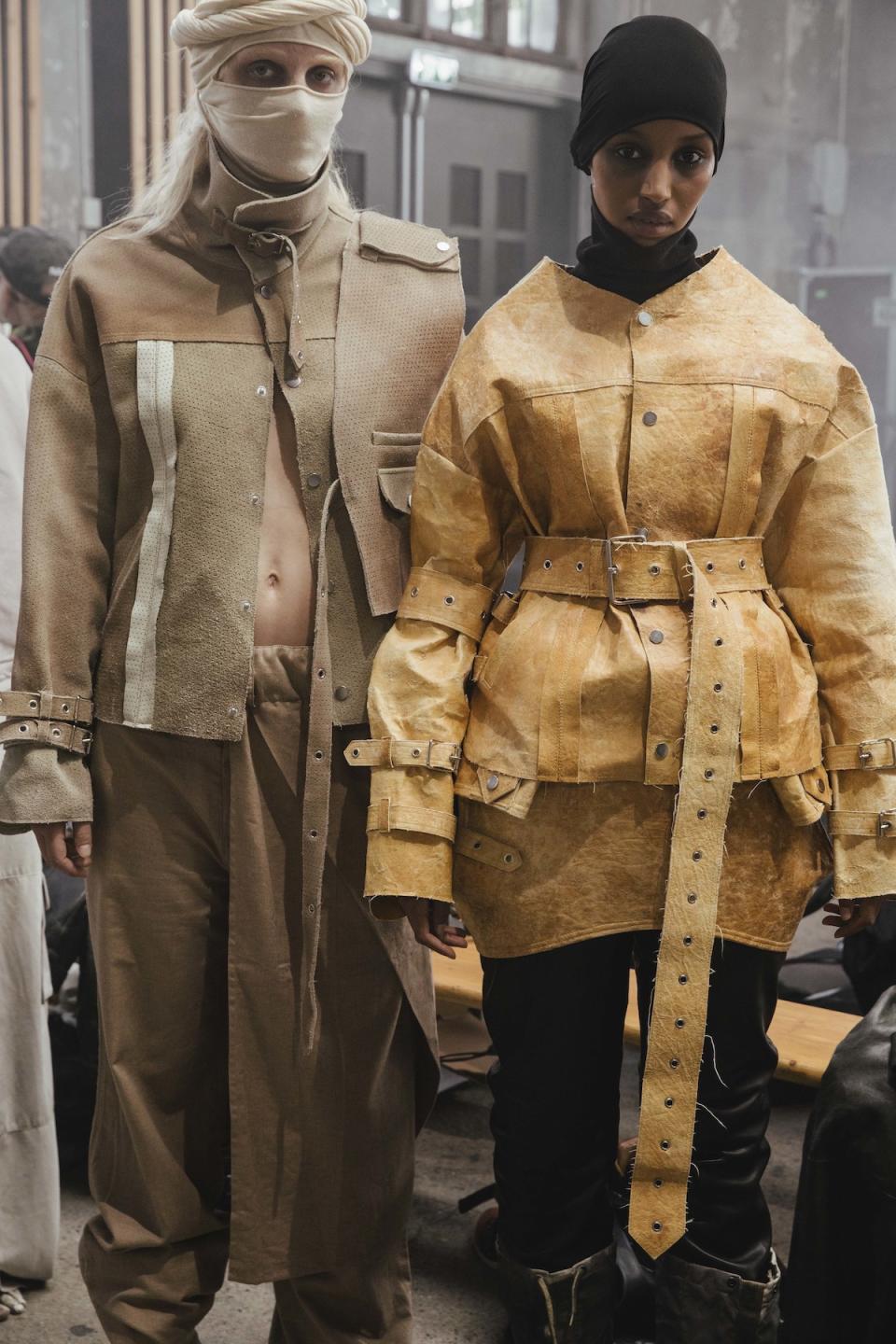
The first ready-to-wear garments made with MycoWorks’ Reishi natural leather alternative debuted at Copenhagen Fashion Week this summer, collaborating with the Stockholm-based brand Deadwood Studios.
“Every square centimeter of this material is a work of art itself, and nature is the artist,” Deadwood Studios’ co-founder Felix von Bahder said of the Fine Mycelium product. “I just love the raw quality of the surface with its organic formations of spots and specks. That’s what perfection looks like to me.”
After partnering on a bespoke collaboration for Paris Fashion Week, the duo dropped a made-to-order four-piece collection available for purchase on Deadwood’s website. It’s the first ready-to-wear capsule collection made entirely in Fine Mycelium, consisting of a statement, coat, vest, jacket and bag—all in the natural golden-brown shade.
“Reishi is a unique material to work with: supple but structured, its natural mycelial color and marbled detailing add a rawness unmatched with other fabrics on the market,” Deadwood Studios’ co-founder Carl Ollson said. “We have received a lot of interest in our capsule collection made with Reishi with so many people asking us about the material and it has had a great sell-through.”
The Bay Area biomaterial company employs a proprietary Fine Mycelium process to grow the mycelium roots in a controlled environment, letting the fungi roots form interlocking cellular structures that “form the building blocks of their materials,” specifically, the Reishi. MycoWorks claims it’s the only mycelium-made leather alternative that “meets the luxury industry’s performance standards and climate commitments.”
“It’s so special to see designers learn to fabricate with our new material,” said Bill Morris, MycoWork’s vice president of product design. “Deadwood has really taken the Reishi for what it is, and harnessed the natural characteristics of mycelium into raw, beautiful and natural design.”
Mansur Gavriel x Mabel Industries
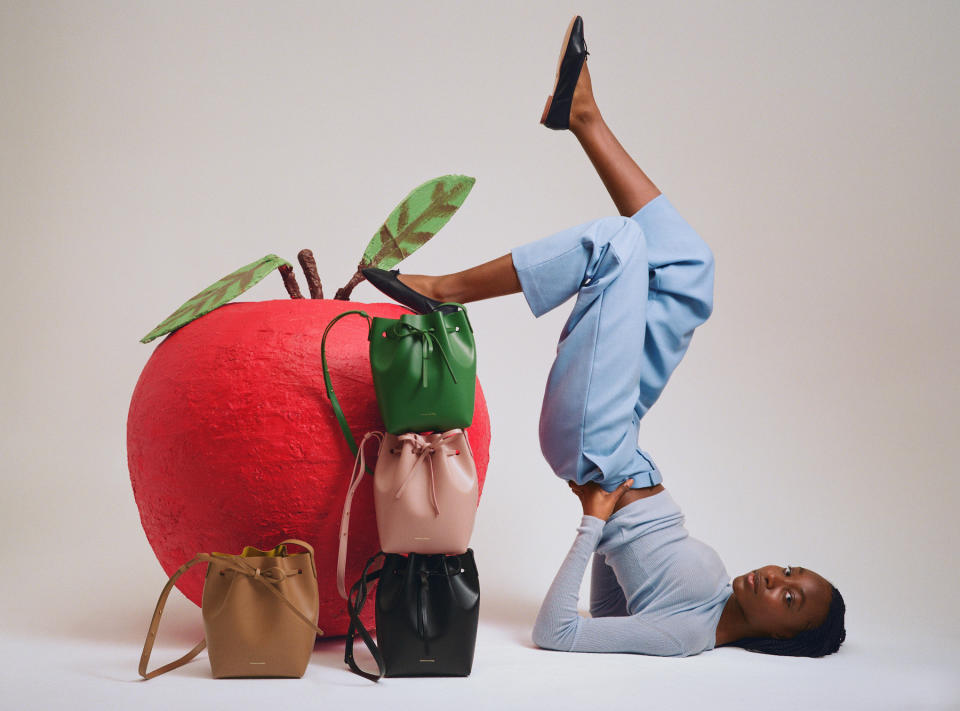
Ten years ago, Mansur Gavriel hit the ground running with its debut collection of bucket bags. A decade later, in March, the luxury label introduced the Apple Leather bucket bag, its first bio-based handbag, as part of its permanent collection.
After nearly two years of research, founders Rachel Mansur and Floriana Gavriel went with their brand’s iconic bucket bag silhouette for the inaugural collection, using 100 percent apple leather from Northern Italy.
Created by Mabel Industries, the apple leather is produced through a coagulation process that swaps out 50 percent of fossil fuel inputs with waste such as peels and cores discarded by the apple industry—resulting in a leather alternative that’s waterproof, durable and vibrant in color.
“The early stages of R&D bring us back to 2021, when Mabel, a company active in the production of polyurethane coated materials, started playing with the industrial waste of the apple juice industry,” Umberto Bacenetti, CEO of Mabel Industries, said. “Italy is one of the largest producers of apples worldwide and everything that is left out of the production of apple juice is going into waste management, [with] all annexed costs and damages to the environment.”
Mabel’s branded AppleSkin material begins in Italy’s apple-producing South Tyrol province, which generates an estimated 30,000 tons of waste such as skins and peels. These byproducts are then recovered by Bolzano-based company Frumat, which pulverizes the castoffs into powder. Mabel uses this powder instead of oil derivatives (such as polyurethane foam) to create what it bills as a vegan option to replace animal-derived leather.
Pangaia x Avantium
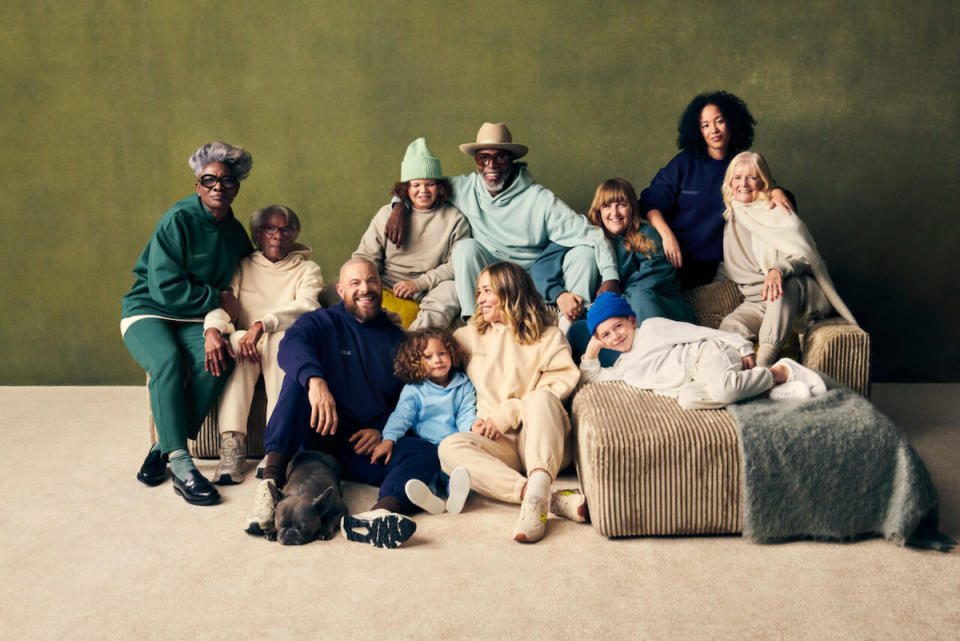
Pangaia and Avantium share the common goal of developing fossil-fuel-free and recyclable materials. As such, the two are teaming joining forces to create a sustainable apparel collection.
The materials science B Corp. will purchase the Dutch renewable chemistry company’s plant-based and recyclable polymer, polyethylene furanoate (PEF), which can replace PET fibers.
Avantium’s PEF is derived from furandicarboxylic acid (FDCA), also referred to as next-generation polyester. The first commercial FDCA flagship plant is currently under construction in Delfzijl, the Netherlands, with large-scale production anticipated to begin in the second half of 2024.
“Pangaia has a huge emphasis on identifying innovation opportunities that help us replace conventional fossil fuel-based materials with materials that utilize renewable feedstocks. Feedstocks tackle one art of the puzzle, however, and only by producing these at scale and building into circular business models do they really create impact, which Avantium is on a mission to do,” Pangaia Collective said. “By working with Avantium and their PEF material, there’s incredible scaling potential to utilize PEF across a range of product categories, which has led us to this partnership agreement. We look forward to introducing this innovative material once Avantium’s flagship plant is operational.”
PEF claims to fit current polyester infrastructure for both production and recycling, therefore presenting a scalable future for renewable alternatives to fossil-fuel-derived PET. Furthermore, Avantium said PEF-based fiber has a significantly lower carbon footprint than traditional inputs and can be recycled into existing assets.
“We are pleased to partner with Pangaia, a leading innovator in the materials and fashion industry, enabling consumers to wear PEF-based clothing. Together, we will demonstrate that PEF-based clothing has great potential to play a key role in reducing the fashion industry’s impact on the climate,” said Tom van Aken, CEO of Avantium. “We look forward to our continued collaboration with such an innovative brand and to supporting Pangaia’s strong sustainability journey in the coming years. It will be truly exciting to see consumers wearing Pangaia’s PEF-based sustainable fashion in the future.”
Solve the daily Crossword

